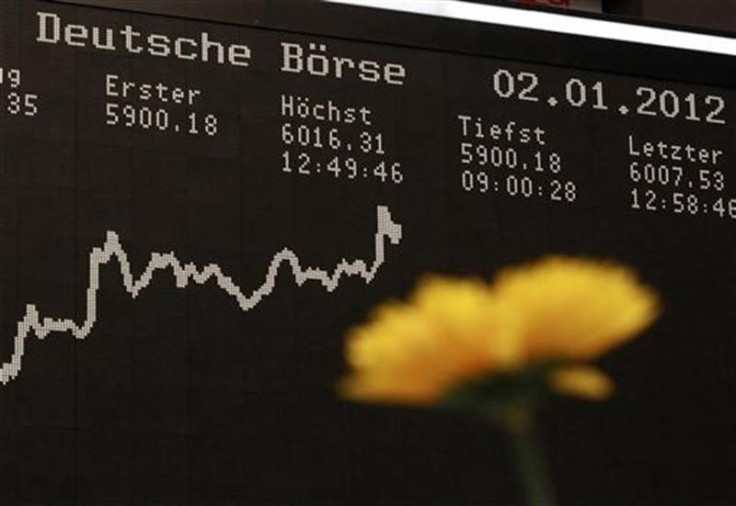European Stocks Level off after Hitting Six-Month High

(REUTERS) -- European shares steadied after hitting a six-month high on Thursday as strong gains in miners on merger talks between Xstrata (XTA.L) and Glencore (GLEN.L) were offset by a sell-off in defensives, with Unilever (ULVR.L) down on poor outlook.
Although recent encouraging macroeconomic numbers had increased optimism that this week's U.S. jobless claims and nonfarm payroll numbers would surprise on the upside, some investors positioned themselves for a setback. Societe Generale predicted a lower-than-consensus figures for U.S. payrolls data.
Mining stocks were the top gainers, with the STOXX Europe 600 Basic Resources index .SXPP up 2.6 percent, helped by a 10.4 percent jump in mining group Xstrata and a 5.4 percent rise in commodities trader Glencore on talks about an all-share deal that could create a combined group worth more than 50 billion pounds ($79 billion).
This deal, if confirmed, will bring huge value to shareholders ... and bring them both into line to compete with larger mining companies, Atif Latif, director of trading equities & derivatives at Guardian Stockbrokers, said.
However, the FTSEurofirst 300 index .FTEU3 of top European shares was flat at 1,057.36 points at 1022 GMT after hitting its highest since August. Food and beverages shares .SX3P fell 1 percent, hit by Unilever, down 3.9 percent, which said 2012 would be a difficult year as growth in emerging markets slows and demand in Europe and North America stays flat at best.
Charts showed the technical picture remained positive after recent moves. The blue-chip Euro STOXX 50 .STOXX50E index was up 0.2 percent at 2,475.43 points, after closing in the previous session above the 2,467 resistance level - the 38.2 percent Fibonacci retracement from the Aug 1-11 impulse wave.
This suggests the price action is likely to test its 2,500 resistance area, which is the top of the October impulse wave. This area is a strong resistance, which could become an obstacle on the way up, technical analyst at RBS.
ECONOMIC INDICATORS
Analysts said this week's key economic indicators could set the market's near-term direction, as encouraging numbers after recent upbeat global manufacturing data might cement the view that the global economy was gradually recovering.
U.S. jobless claims data for the week ended January 28, due at 1330 GMT, is expected to show 375,000 new filings, against 377,000 a week earlier. The numbers will shed some light on Friday's nonfarm payrolls data. According to a Reuters survey, the number rose 150,000 after increasing 200,000 in December.
Societe Generale said anticipated seasonal layoffs of couriers and messengers, combined with continued pink-slipping by cash-strapped states and municipalities, likely capped the rise of nonfarm payrolls at a below-consensus 110,000.
If the SG forecast turns out to be correct, this could lead to an intraday drop in risky assets due to the negative surprise element, it said in a note, adding the S&P 500 index .SPX could fall 0.2 percent in the first 30 minutes after the release of the payrolls data.
Jeremy Batstone-Carr, head of private client research at Charles Stanley, said that until now investors had enjoyed the revival apparent in high beta miners and banks and in part this had reflected some improvement in U.S. macroeconomic data.
We wonder how sustainable is the U.S. macroeconomic 'decoupling' from Europe?, he asked, but added that dividend yield still looked a good safety first option in a very uncertain investing world.
Citigroup expected a global equity investor to collect a dividend yield of 3 percent this year, close to the highest in the last 20 years, but also noted that despite attractive yields, investors remained reluctant to buy equities as volatility was one obvious issue.
Credit Suisse retained its small underweight position on European cyclicals, saying they were overbought and the ISM figures were likely to move lower over the next few months.
Its preferred cyclicals included the software, luxury goods and luxury cars segments, while among defensives, it liked drugs and emerging market telephony.
Among individual movers, Deutsche Bank (DBKGn.DE) fell 1.8 percent after a surprise quarterly loss, with the bank hit by a downturn in bond trading due to the euro zone debt crisis. AstraZeneca (AZN.L) fell 3.9 percent as it expected earnings to fall 14-18 percent this year.
© Copyright Thomson Reuters 2024. All rights reserved.






















